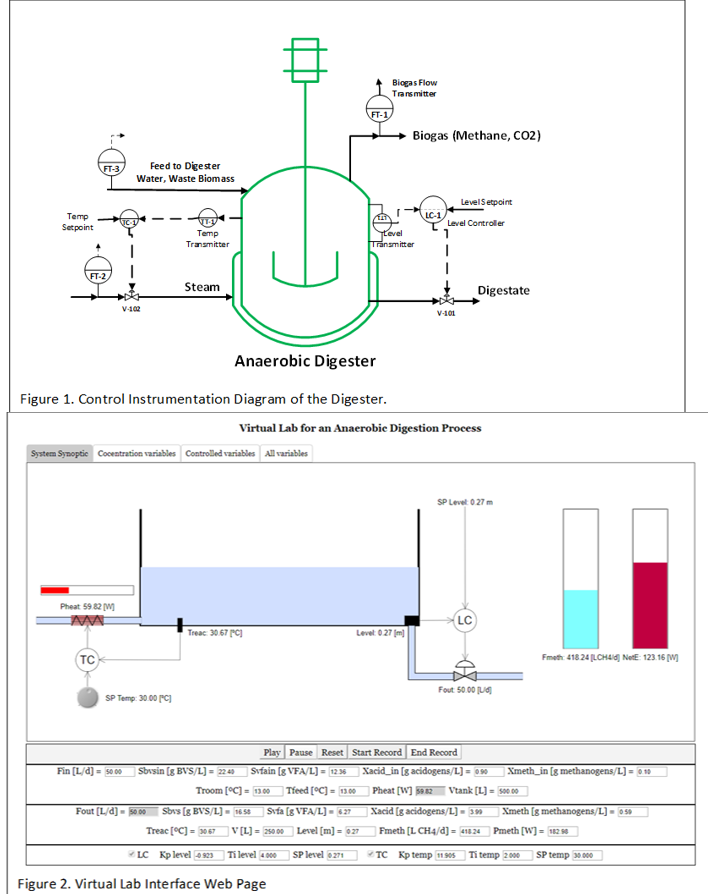2020 Virtual AIChE Annual Meeting
(271e) A Web-Based Unit Operations Lab for Enhancing Design, Control and Optimization in Chemical and Biochemical Engineering Courses
Authors
A Web-Based Unit Operations Lab for Enhancing Design, Control and Optimization in Chemical and Biochemical Engineering Courses
Abstract
As we progress from delivery of instructional material from classroom to the internet, there is a need to develop virtual laboratory exercises to supplement the theoretical concepts covered in lectures. Many solutions are available on the Internet to deal with theoretical concepts remotely by the use of Learning Management Systems (LMS). However, solutions for laboratory exercises are usually scarce and most of the time they are substituted by theoretical exercises. Experimental exercises in a laboratory setting are really important in any discipline, but it is particularly relevant in engineering studies, where lab sessions are the connections between theory and practice by the use of real systems or semi-industrial processes. In the last decade, virtual labs have proven to be very versatile and valuable for providing practical experience for students in STE (Science, Technology and Engineering) fields (Alkhaldi, Pranata et al. 2016, Galan, Heradio et al. 2016, Heradio, de la Torre et al. 2016, Heradio, de la Torre et al. 2016, Potkonjak, Gardner et al. 2016). The main feature of these virtual labs is that they provide experiments that are based on realistic models of industrially important and technologically challenging process systems, what increases motivation of the students and at the same time provides relevant practical knowledge that enhances their educational experience.
There are many ways to provide web-based experimental experience. One approach is to create remote labs, which are web-based solution with access to actual experiments which can be operated remotely. Although this solution allows student to connect with the real system, it is limited to one user at a time which reduces its accessibility and it requires modifications in the real facilities to allow safe remote access and operation. A second approach is to develop virtual labs, which base the experiments on a virtual model of a system or process that mimics real-world behavior as much as possible. Such simulated exercises may be downloadable and run on a personal computer often using specialized software platforms such as Matlab or Aspen Plus. With the increased use of alternatives to personal computer such as tablets, smart phones and similar devices, the versatility of access and use can be improved if the virtual lab could be run entirely on the web without the need to download and use expensive software platforms.
In this presentation, we will discuss the development and use of a purely web-based simulation lab to teach concepts of design, operation, control and optimization of an anaerobic waste digester. The process is highly motivating to the students since it addresses two of the most pressing societal issues: waste biomass disposal and production of renewable energy. The anaerobic digester converts waste biomass into energetically useful biogas while producing organic manure.
The virtual simulation model of the Anaerobic Digester (AD) was developed using a flexible Javascript platform created at the University of Murcia in Spain called Easy JavaScript Simulations (Esquembre, 2015) and it based on well-known anaerobic digester models (Husain 1998, Haugen, Bakke et al. 2013, Haugen, Bakke et al. 2013, Haugen, Bakke et al. 2014, Xie, Hai et al. 2016). The objective was to supplement courses in process control and process design with a laboratory component. This virtual laboratory experience could be used on any device capable of accessing the web (laptops, tablets, smartphones etc.). It is designed to enable the student to explore the multiple facets associated with a complex biochemical system with a view to understanding its design, operation, control and optimization (see Figure 1). A user-friendly interface (see Figure 2) that allows easy specification and testing of operational parameters is provided. In this presentation, we discuss how the model and simulation is developed and deployed. We will demonstrate examples of its use in an educational environment.
References
Alkhaldi, T., I. Pranata and R. I. Athauda (2016). "A review of contemporary virtual and remote laboratory implementations: observations and findings." Journal of Computers in Education 3(3): 329-351.
Esquembre, F. (2015) "Facilitating the Creation of Virtual and Remote Laboratories for Science and Engineering Education". IFAC PapersOnLine, 48(29): 49â58.
Galan, D., R. Heradio, L. de la Torre, S. Dormido and F. Esquembre (2016). "Virtual Control Labs Experimentation: The Water Tank System." IFAC Papersonline 49(6): 87-92.
Haugen, F., R. Bakke and B. Lie (2013). "Adapting Dynamic Mathematical Models to a Pilot Anaerobic Digestion Reactor." Modeling Identification and Control 34(2): 35-54.
Haugen, F., R. Bakke and B. Lie (2013). "Temperature Control of a Pilot Anaerobic Digestion Reactor." Modeling Identification and Control 34(3): 99-117.
Haugen, F., R. Bakke and B. Lie (2014). "State Estimation and Model-Based Control of a Pilot Anaerobic Digestion Reactor." Journal of Control Science and Engineering.
Heradio, R., L. de la Torre and S. Dormido (2016). "Virtual and remote labs in control education: A survey." Annual Reviews in Control 42: 1-10.
Heradio, R., L. de la Torre, D. Galan, F. J. Cabrerizo, E. Herrera-Viedma and S. Dormido (2016). "Virtual and remote labs in education: A bibliometric analysis." Computers & Education 98: 14-38.
Husain, A. (1998). "Mathematical models of the kinetics of anaerobic digestion - A selected review." Biomass & Bioenergy 14(5-6): 561-571.
Potkonjak, V., M. Gardner, V. Callaghan, P. Mattila, C. Guetl, V. M. Petrovic and K. Jovanovic (2016). "Virtual laboratories for education in science, technology, and engineering: A review." Computers & Education 95: 309-327.
Xie, S. H., F. I. Hai, X. M. Zhan, W. S. Guo, H. H. Ngo, W. E. Price and L. D. Nghiem (2016). "Anaerobic co-digestion: A critical review of mathematical modelling for performance optimization." Bioresource Technology 222: 498-512.
